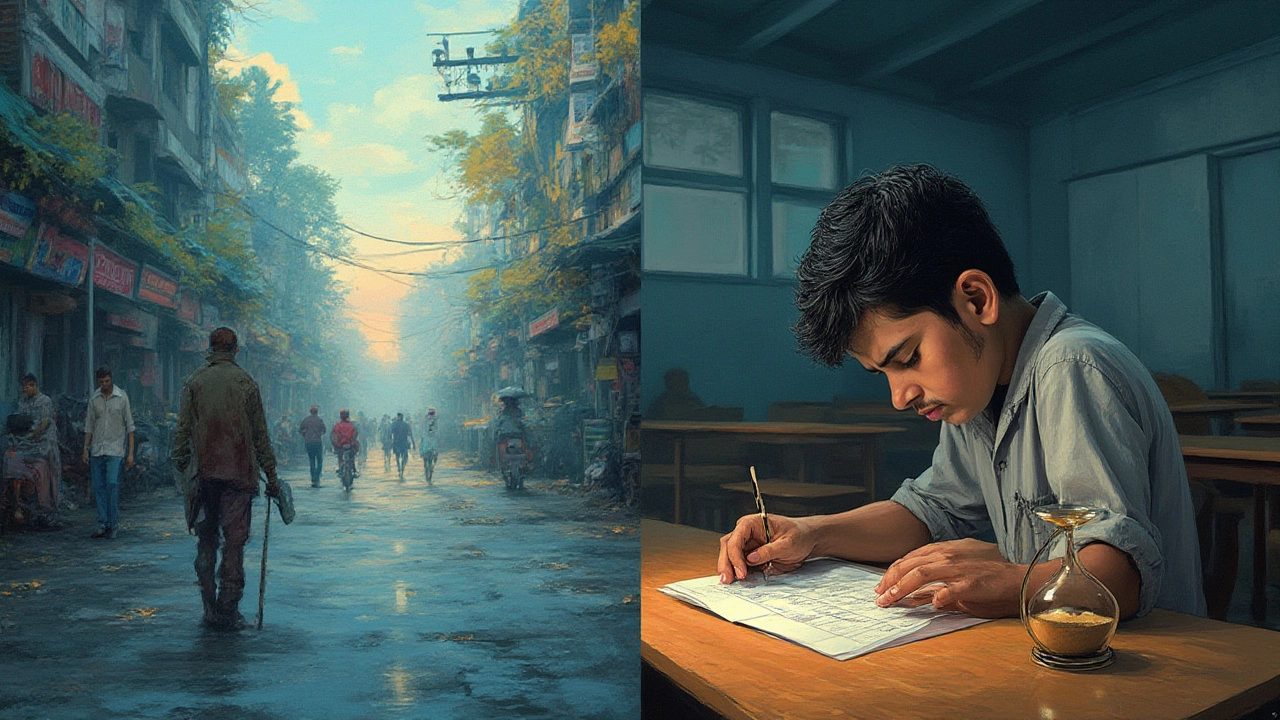29 Jul
2025
Hardest Professional Exams: Which Test Reigns Supreme?

Every year, people with nerves of steel and a mountain of ambition stare down the world’s most infamous professional exams. Passing one isn’t just about being smart on paper—it’s like surviving a marathon in a hurricane. Some folks end up acing it, while others keep coming back, year after year, like it’s an extreme sport. So what pushes these professional tests into the realm of “legendary”—and which one steals the crown for being the absolute hardest?
The World’s Toughest Professional Exams: Where Legends Are Made
When people debate which is the hardest professional exam on earth, a few big names always make the list: the United States Medical Licensing Examination (USMLE), Chartered Financial Analyst (CFA), Indian Administrative Services (IAS), and the Japanese Architect License. Lawyers in the US sweat over the California Bar, while actuaries lose sleep during the Fellowship exams. But what actually makes these juggernauts harder than the rest? It’s not just cramming facts. These tests push the boundaries of memory, mental stamina, problem-solving, ethics, and—maybe most critical—the ability to keep your cool when you’re about to panic.
Let’s take the CFA exams as an example. Three levels, each famously designed to crush your spirit before it makes you a leader in finance. Test-takers often refer to Level II as “the beast”—for good reason. Earning all three letters (CFA) means slogging through more than 900 hours of study, passing rates under 45%, and a curriculum that covers everything from ethics to portfolio management (and if you stumble on those ethical scenarios, it’s game over, even if you’ve aced all the math). If finance isn’t your game, the USMLE is another marathon. Future doctors must navigate three steps, each more complex, with Step 1 even terrifyingly affecting their whole medical career path. In 2024, Step 1 became pass/fail, but that doesn’t mean it’s become easier—it just changed the way future doctors feel the pressure.
Over in India, aspirants fight through the IAS exam, also known as the Civil Services Exam (CSE). Here’s how it looks: a preliminary round that weeds out more than 90% of candidates, then headlong into a marathon of essays, interviews, current affairs, and niche subjects like hydrology or social justice. Each year, around a million people sign up—and less than a thousand get the top posts. That’s a 0.1% success rate. Imagine playing a video game with that kind of odds. Meanwhile, in Japan, would-be architects tackle a licensing exam so tough that most need multiple attempts; pass rates hover under 10%. And let’s not gloss over the actuarial path—actuarial science candidates in both the US and UK face up to 15 exams that span a decade of their lives, with fail rates above 60% per sitting.
But complexity isn’t the only factor. The California Bar Exam deserves a shoutout, having one of the lowest pass rates for lawyers in the US—sometimes dipping below 40%. It’s not just about memorizing legal codes but about applying logic on the fly when your brain is fried. And while most people can train to be an airline pilot, the Federal Aviation Administration’s ATP practical exam has a reputation for exposing even tiny errors—something future captains can’t afford. The phrase ‘the hardest exam’ often depends on who you ask: want to crunch numbers and predict the future? Try actuary exams. Want to heal people? USMLE. Dream about shaping society? IAS or the Japanese Bar.
Notice the pattern? These tests aren’t just hard because they have pages of stuff to read, but because they require you to think, react, and adapt at a level beyond university finals. The pass rates aren’t low by coincidence—they’re a direct reflection of the high standards needed for those careers.

What Actually Makes an Exam “Hard”? Breaking Down the Factors
The word “hard” gets thrown around. But what’s really going on when eggs get scrambled and even geniuses stumble? The answer isn’t just in the content—it’s the combination of mental load, time pressure, application skills, and, yes, the emotional toll. Here are the nuts and bolts:
- Breadth and depth: Some exams feel never-ending. Take the CFA, which covers finance topics from microeconomic theory right down to technical analytical skills. Or the USMLE, which expects medical students to know every nerve pathway, disease, and emerging breakthrough in the medical world.
- Application vs. memorization: Highschoolers dread rote memorization, but in pro exams, the challenge is flipping between knowing a fact and applying it to unexpected, complex scenarios. Try answering a legal essay question on a new precedent that hit the headlines last week or diagnosing a rare disease within a minute.
- Format and time pressure: Some tests run for six straight hours. Others are split over multiple days. It’s not just knowing the stuff—it’s keeping that focus while exhaustion creeps in. The bar and medical boards are not for the faint-hearted.
- Competition and pass rate: In the IAS exam, you’re not just aiming to pass—you’re climbing a pyramid, trying to beat thousands for a handful of top ranks. The CFA? If only 40% pass and many are finance pros, that’s like playing tennis while everyone else is swinging golf clubs.
- Long-term dedication: Actuaries sometimes sit for their last exam ten years after the first. It’s like running not one, but several marathons back to back, all while working a real job and living life.
Psychologists have actually studied what makes professional exams mentally brutal. Research out of Stanford found that candidates prepping for high-stakes medical boards showed cortisol levels similar to those in elite athletes before a championship game. The grind, the hours, the chance of failure—none of it makes people quit, though. Many find the process itself turns them into better professionals, not just walking textbooks. Believe it or not, people sometimes grow addicted to overcoming these insane challenges; it’s the thrill and misery all mixed together.
Here’s a quick secret: Top-performing students almost never try to wing it. They structure their prep like athletes—timed practice, simulated exams, reviewing every error. Medical students use ‘spaced repetition’ apps (Anki is a legend), CFA hopefuls join forum groups to swap mock questions, and English Bar candidates keep a ruthless notebook of every mistake. Success doesn’t come from last-minute cramming; it’s a lifestyle for months, sometimes years.
If you’re walking into the abyss, it helps to remember people do get through—often on the third or fourth try. And a surprising number of world leaders, CEOs, and famous thinkers have failed these gargantuan exams at least once. Not passing is part of the mythos. The key is resilience, obsessiveness, and the ability to flick the mental switch from “I can’t do this” to “Bring it on.”

Battle-Tested Tips: How to Survive (and Beat) the Hardest Exams
If you’re brave—or a little bit nuts—enough to take on one of these monsters, you’ll need more than good intentions and a highlighter. Here’s what works, according to people who’ve been through the grinder and research on high-stakes testing. You’ll find stories in the wild about people studying 4 hours before dawn, but consistency wins over wild sprints.
- Start early and think long-term: You can’t fix everything in the last two weeks. Whether CFA or Bar, most who pass have a year-long (or more) prep plan. Short, steady daily sessions beat monster sittings that fry your brain.
- Mix up study techniques: Don’t just read and reread. Use practice questions, teach the subject to someone else, and drill weak spots with flash cards. If you’re prepping for data-heavy exams, do calculation drills. For law or essay questions, map out skeleton outlines until your brain does it automatically.
- Mimic the real environment: Take regular full-length practice exams, timed, with no phone, and only scheduled breaks. Want to feel the fear and power through anyway? This is how veterans build test-day stamina.
- Track your progress and mistakes: The best of the best keep diaries of every failed question. They know what trips them up, and don’t just focus on strengths. Journal your journey, because it’s that easy-to-ignore weak area that can tank your real exam.
- Don’t neglect your mind and body: Exam prep is an endurance sport. Nutrition, sleep, exercise, and occasional breaks are part of the plan. Even elite test-takers use meditation apps or run a few laps every morning.
- Community matters: Forums, study partners, and mentors help. CFA study groups, Indian CSE coaching circles, and actuaries’ WhatsApp squads all exist for a reason—sometimes a trick or motivation boost can only come from someone who’s been in your shoes.
Failure stings, but it’s not a sign you’re in the wrong place. Most people taking these exams are supremely smart, motivated, and have a track record of success. It’s just that these tests are made so only the best-prepared walk away with the certificate or badge. If you’re staring down the barrel of one of these giants, remember everyone feels moments of self-doubt. Use it as fuel.
So, which is the ultimate boss fight—the hardest professional exam? There’s no one answer. The “hardest” title shifts depending on your profession, country, and skill set. But if your brain feels fried just reading about them, you’re not alone. Whether you’re aiming to be a surgeon, an actuary, or the next civil servant to shape a nation, the standards are stratospheric—and the journey, though tough, shapes you into something more than a certificate holder. Stay tough. You’re building more than a career—you’re gaining a story worth telling for the rest of your life.
Write a comment ( All fields are required )